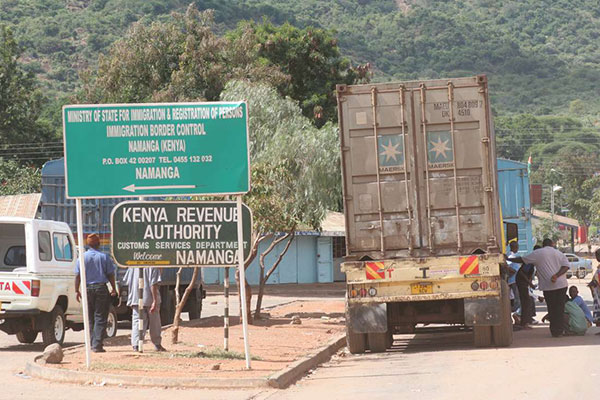Tanzanian officials have put off a meeting intended to iron out outstanding trade disputes with Kenya amid concerns Dar es Salaam was maintaining a hardline stance in the spat.
Representatives of the two countries, including officials from cross-border trade agencies, were expected to meet from Wednesday in Tanzania, according to an agreement reached on August 3.
But Kenya’s principal secretary for trade Chris Kiptoo, who was also scheduled to meet his Tanzania counterpart Adolf Mkenda on Friday, said the meeting was off following a note from Tanzania postponing the meeting.
“I have just seen the note asking for a postponement to 9th September. We would review it and communicate the outcome. My technical team was ready including the private sector to begin these negotiations which had started on a positive note,” Mr Kiptoo said.
The Namanga agreement
The two trade bosses led a meeting in Namanga where both countries agreed to lift some of the trade restrictions, including the one that barred milk and milk products from Kenya from entering Tanzania and the restrictions on wheat from Tanzania.
The agreement resolved to allow some 26 trucks ferrying wheat from Tanzania that were stopped at the border to be allowed entry into Kenya and opened borders for Kenyan milk and milk products some of which had expired over the standoff, leading to unquantifiable losses.
The Namanga agreement failed to reach a deal on a number of issues raised by Kenya, including a higher tax on cigarettes from Kenya which are treated like products coming outside the East African Community.
Tanzania cited domestic legislation when it hit Kenya cigarettes with an excise tax of 75 per cent, pricing them out of the market.
“The United Republic of Tanzania will develop an action plan to address the issue and communicate the framework for the implementation to the Republic of Kenya during the next bilateral meeting,” read the agreement signed by both officials.
Kenyan Tobacco manufacturers said the prohibitory taxation was in breach of East African Community laws.
The protocol treats all goods originating from partner states as community goods, hence tradable under the Community preferential tariff treatment.
Kenya and Tanzania have had long trade squabbles across their borders that received the attention of both President Uhuru Kenyatta and Tanzania’s John Magufuli.
A trade truce signed between Foreign Affairs cabinet Secretary Amina Mohamed and her Tanzanian counterpart Augustine Mahinga was not followed to the letter as Kenyan products still experienced various barriers forcing Mr Kiptoo to travel to Namanga for the August 3rd meeting.
Kenya’s exports to Tanzania dropped 34 per cent in the first five months of the year to Sh4.35 billion raising concerns over negative impacts of the long running trade standoff.
Tanzania has been Kenya’s second largest market in the region after Uganda, providing sale outlet for a range of products that include palm oil, soap, medical drugs, cooking fats, iron sheets, sugar confectionery, and margarine.
Theeastafrican



